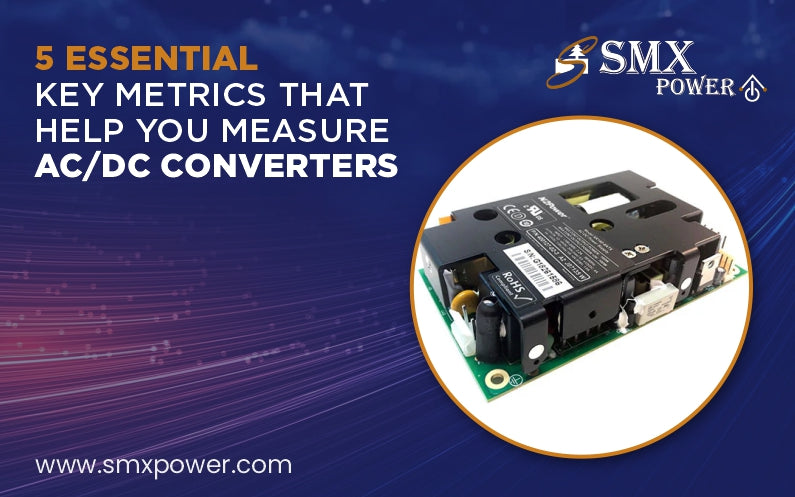Do you want to know how you can check the performance of your AC/DC converter? Well we have your back. But before knowing the metric that can check the performance of an AC/DC converter let’s know about the function of an AC/DC power converter.
What is an AC/DC converter?
An electronic device that converts the alternating current to direct current is called an AC/DC converter. The difference between an AC and DC current is the direction in which the electron flows. While electrons continuously change directions in AC, moving ahead and then backwards, they flow constantly in one direction in DC.
There are four components of AC/DC converter they are:
- Transformer: It helps to adjust the voltage level of the AC supply.
- Rectifier: It allows the conversion of AC to DC by allowing current to flow in only one direction.
- Filter: It lets conversion of the AC to DC by allowing current to flow in only one direction.
- Regulator: It ensures a constant DC output voltage.
Now that you know what are the different components of an AC/DC converter, let's know ways in which an AC/DC converter can help you by converting alternating current to direct current.
What Is the Importance of AC/DC Converters?
Knowing about the functions of the AC/DC converters will help you in understanding its role as an electrical solution. To further enhance your understanding let see some of the important roles of an AC/DC converter.
One of the key roles of an AC/DC converter is that it can be used in the wide range of the applications that enables the devices to operate on the standard AC power supplies.
Moreover it reduces power consumption and operating cost by increasing efficiency and reducing energy loss in the conversion process. In this regard, they offer some crucial features of an AC/DC converter, but not all of the essential ones.
What are the Performance Metrics of AC/DC converters?
While AC/DC converters are very helpful in minimizing the wastage of the resources, that's not where you should stop if you are serious about the optimization of your power consumption and operational cost.
By measuring the performance of your AC/DC converters you can optimize your overall system cost. Here are some metrics that will help you measure the performance of AC/DC converters:
1. Power Factor: You can measure the efficiency of the input power that is being used in the system. Power factor is calculated as the ratio of real power to apparent power.
-
If the power factor is closer to one that indicates the efficient use of input power that leads to reduction in losses.
- The higher the power factor the more it reduces the load on the power supplies and lessens the energy cost.
2. Total Harmonic Distortion (THD): Measures the level of harmonic distortion in the output signal, which is the deviation from the ideal sinusoidal shape caused by non-linear loads.
-
Lower THD indicates a cleaner DC output, crucial for the performance and longevity of electronic devices.
- High THD can cause overheating, noise, and reduced efficiency in electrical systems.
3. Ripple Voltage: Refers to the residual periodic variation (or noise) in the DC output voltage after rectification and filtering.
-
Lower ripple voltage indicates a smoother and more stable DC output.
- High ripple voltage can interfere with the operation of sensitive electronic circuits and components.
4. Load Regulation: Describes the ability of a power supply to maintain a constant output voltage despite changes in the load (current drawn by the device).
-
Good load regulation ensures the output voltage remains stable, protecting connected devices from voltage fluctuations.
- Critical for applications where the load varies significantly over time.
5. Line Regulation: Describes the ability of a power supply to maintain a constant output voltage despite variations in the input voltage.
-
Good line regulation ensures the output voltage is stable even when the input voltage fluctuates, providing reliable power to connected devices.
- Essential for devices operating in environments with unstable or varying power sources.
Conclusion
Delivering effective, dependable, and high-quality power to electronic devices requires optimizing certain performance criteria in AC/DC power conversion systems. SMX Power offers AC/DC converters that are cost effective and reliable. You can check our varied range of power supply products that we offer for all types of power solutions.
To get the greatest results, engineers must concentrate on cutting-edge design methods, high-quality parts, and sensible power management plans.
Comprehending and refining these data not only improves the performance of individual devices but also adds to the overall sustainability and efficiency of the system.

